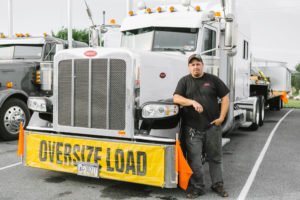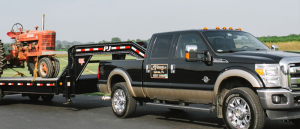Furry Friends Cause Trucking Border Delays At Canadian Border
To prevent reintroduction of rabies carried by dogs into the United States, new CDC regulations require proof of healthy pets at border crossing. Truckers who
We are a team of DOT Compliance and Licensing Professionals helping trucking and transportation companies remain safe, compliant, and profitable.
CNS or Compliance Navigation Specialists is DOT Compliance company that assists trucking and transportation companies remain DOT Compliant. We are part of a network of companies, CNS Companies, specializing in services related to the transportation, manufacturing, construction, service, education and medical industries.

A full-scale DOT Compliance Program managing a long haul carrier’s safety, compliance, licensing and more.
Learn more >>>
A DOT Compliance Program that keeps motor carriers compliant with the 6 Basic DOT Regulations required of all carriers.
Learn more >>>
Our Short-Haul/Construction Program is a full-scale program designed for private carriers that do not haul for-hire.
Learn more >>>
Our most comprehensive DOT Compliance Program, operating as your company’s off-site Safety Director or assisting your current safety personnel.
Learn more >>>
Our Non-CDL Program is a full-scale program managing safety, compliance, licensing and more for moving companies, couriers, landscapers, or any company subject to DOT regulations and does not employ CDL drivers.
Learn more >>>
Our DOT Audit Services cover a number of different types of DOT Audits that new and existing carriers will be subject to.
Our DOT Driver Services help trucking companies and carriers to stay compliant as they grow and hire more drivers.
Our DOT Vehicle Services focus on ensuring your vehicles are compliant with DOT Regulations, which is just as important as your drivers.
Our DOT Services for Special Carriers focus on companies outside of the typical motor carrier, like HAZMAT, Passenger and Bus Carriers.
CNS is part of a group of companies that offer other necessary services for the trucking and transportation industry, such as Commercial Trucking Insurance, CDL Training, Online Training Course, and even Healthcare.
Our DOT Licensing Services will cover you whether you are an existing company or just starting a trucking company. Our DOT Licensing Specialists can help you get up and running and in days with your DOT number, MC Authority, EIN, UCR, IFTA, 2290 HVUT, Fuel Taxes and can even set you up to get your Commercial Driver's License (CDL) with CNS Driver Training Center.
Our DOT Licensing Specialists will help you with every aspect of starting a trucking company. All you need to do is choose a name for your trucking company.
You will need to ensure your DOT Number, MC Authority, Vehicle Registration, etc. is all set up properly when you start your trucking business.
Our Licensing Specialists can help with all aspects of filing and renewing licenses, fuel taxes, etc.
CNS is part of a group of companies that offer other necessary services for the trucking and transportation industry, such as Commercial Trucking Insurance, CDL Training, Online Training Course, and even Healthcare.
To prevent reintroduction of rabies carried by dogs into the United States, new CDC regulations require proof of healthy pets at border crossing. Truckers who
CNS or Compliance Navigation Specialists is DOT Compliance company that assists trucking and transportation companies remain DOT Compliant. We are part of a network of companies, CNS Companies, specializing in services related to the transportation, manufacturing, construction, service, education and medical industries.
CNS Companies is a network of companies specializing in services related to the transportation, manufacturing, construction, service, education and medical industries. Our DOT Compliance division is handled by Compliance Navigation Specialists, CNS Insurance handles Commercial Truck Insurance, CDL training is managed by the CNS Driver Training Center and healthcare is managed by CNS Occupational Medicine.
We are a team of DOT Compliance and Licensing Professionals helping trucking and transportation companies remain safe, compliant, and profitable.
CNS or Compliance Navigation Specialists is DOT Compliance company that assists trucking and transportation companies remain DOT Compliant. We are part of a network of companies, CNS Companies, specializing in services related to the transportation, manufacturing, construction, service, education and medical industries.

A full-scale DOT Compliance Program managing a long haul carrier’s safety, compliance, licensing and more.
Learn more >>>
A DOT Compliance Program that keeps motor carriers compliant with the 6 Basic DOT Regulations required of all carriers.
Learn more >>>
Our Short-Haul/Construction Program is a full-scale program designed for private carriers that do not haul for-hire.
Learn more >>>
Our most comprehensive DOT Compliance Program, operating as your company’s off-site Safety Director or assisting your current safety personnel.
Learn more >>>
Our Non-CDL Program is a full-scale program managing safety, compliance, licensing and more for moving companies, couriers, landscapers, or any company subject to DOT regulations and does not employ CDL drivers.
Learn more >>>
Our DOT Audit Services cover a number of different types of DOT Audits that new and existing carriers will be subject to.
Our DOT Driver Services help trucking companies and carriers to stay compliant as they grow and hire more drivers.
Our DOT Vehicle Services focus on ensuring your vehicles are compliant with DOT Regulations, which is just as important as your drivers.
Our DOT Services for Special Carriers focus on companies outside of the typical motor carrier, like HAZMAT, Passenger and Bus Carriers.
CNS is part of a group of companies that offer other necessary services for the trucking and transportation industry, such as Commercial Trucking Insurance, CDL Training, Online Training Course, and even Healthcare.
Our DOT Licensing Services will cover you whether you are an existing company or just starting a trucking company. Our DOT Licensing Specialists can help you get up and running and in days with your DOT number, MC Authority, EIN, UCR, IFTA, 2290 HVUT, Fuel Taxes and can even set you up to get your Commercial Driver's License (CDL) with CNS Driver Training Center.
Our DOT Licensing Specialists will help you with every aspect of starting a trucking company. All you need to do is choose a name for your trucking company.
You will need to ensure your DOT Number, MC Authority, Vehicle Registration, etc. is all set up properly when you start your trucking business.
Our Licensing Specialists can help with all aspects of filing and renewing licenses, fuel taxes, etc.
CNS is part of a group of companies that offer other necessary services for the trucking and transportation industry, such as Commercial Trucking Insurance, CDL Training, Online Training Course, and even Healthcare.
To prevent reintroduction of rabies carried by dogs into the United States, new CDC regulations require proof of healthy pets at border crossing. Truckers who
CNS or Compliance Navigation Specialists is DOT Compliance company that assists trucking and transportation companies remain DOT Compliant. We are part of a network of companies, CNS Companies, specializing in services related to the transportation, manufacturing, construction, service, education and medical industries.
CNS Companies is a network of companies specializing in services related to the transportation, manufacturing, construction, service, education and medical industries. Our DOT Compliance division is handled by Compliance Navigation Specialists, CNS Insurance handles Commercial Truck Insurance, CDL training is managed by the CNS Driver Training Center and healthcare is managed by CNS Occupational Medicine.
To make it easy we like to break down the steps into 3 stages.
The first stage is setting up your Business Entities and DOT authority. Choose your business name. You need to verify that the name you have chosen is available through your home-based state. After confirming your business name is available, you need to choose how you will want to set up business structure – whether an LLC or Sole Proprietorship, S Corp, Partnership, etc. is best for your new company. Once you have  your company name and business structure finalized, you need to obtain your Employer Identification Number (EIN). You need this to set up your business entity, to pay employees, file your 2290, etc. Next, you need to apply for the type of business structure through your business state. This can take a couple of days or weeks depending upon your base states process.
your company name and business structure finalized, you need to obtain your Employer Identification Number (EIN). You need this to set up your business entity, to pay employees, file your 2290, etc. Next, you need to apply for the type of business structure through your business state. This can take a couple of days or weeks depending upon your base states process.
The second stage is obtaining your DOT number and Motor Carrier number. If you are planning to be “For Hire” (meaning hauling someone else’s property) interstate, you need to set up a Motor Carrier Number which can take up to 21 days to become active. If you will be “For Hire” intrastate you need a Public Utility Commission (PUC) number, depending upon your state.
 During your wait for the “For Hire” authority to complete its process, you need to start shopping for commercial auto insurance. The filings from the insurance MCS-90 needs to be filed prior to becoming “Authorized for Hire.” Choosing the right agent is very important when it comes to trucking insurance. Just because you have worked with an agent on your homeowner or car policy doesn’t mean they would be the right agent for you. Work with an agent the specializes in trucking insurance and who knows what coverages you need. It never hurts to get multiple quotes and compare. During the quoting process you need to have your truck and trailer VIN, as well as a qualified driver and driver’s information for processing your quotes (may vary from insurance carrier to carrier).
During your wait for the “For Hire” authority to complete its process, you need to start shopping for commercial auto insurance. The filings from the insurance MCS-90 needs to be filed prior to becoming “Authorized for Hire.” Choosing the right agent is very important when it comes to trucking insurance. Just because you have worked with an agent on your homeowner or car policy doesn’t mean they would be the right agent for you. Work with an agent the specializes in trucking insurance and who knows what coverages you need. It never hurts to get multiple quotes and compare. During the quoting process you need to have your truck and trailer VIN, as well as a qualified driver and driver’s information for processing your quotes (may vary from insurance carrier to carrier).
The next item you need to ensure that your Motor Carrier number will become active is a BOC3 filing. A BOC3 filing is process agent that can receive legal paperwork on your behalf in every state. Along with “Interstate” classification is a filing called a UCR, which is Unified Carrier Registration. This is a mandatory annual fee for interstate carriers to help pay for law enforcement to receive training on new laws and regulations.
When your DOT and MC is active it is time to get your vehicle titled and registered. By waiting until your MC number becomes active to title your vehicle you will save on unnecessary sales tax. If going out of state, you need to register your vehicle through the International Registration Plan (IRP) through your base state. You will then apply for an IFTA sticker. If traveling in NY, KY, OR, and/or NM you need to apply for individual HUT Permits before traveling in those states. Lastly for licensing, you need to file your Heavy Highway Use Tax (2290) within 30 days of registering your truck. 
The third stage we classify as Compliance setup. You will be audited by the FMCSA on your compliance practices within your first year of operation. Get prepared and ace it to set the standard of health and compliance within your new company.
Now that you are licensed properly, and you have properly set up your compliance you will be ready to hit the road. For a more information, or to outsource all of your compliance, insurance and/or licensing needs, contact CNS and or NIS to get setup for success.

Everyone knows that within the first 12 months of operating as a property carrier within interstate commerce, or 120 days as a passenger carrier, each

If you’ve got the vision and desire to start a hotshot trucking company, now is the time to make that vision reality. Hotshot trucking is

Truckload rates for flatbeds, refrigerated and dry vans are at record highs right now and are expected to remain historically high next year as we

According to the American Trucking Association, drivers who practice fuel-efficient driving techniques use about 35% less fuel than those who do not. Typically, fuel is
Our DOT Compliance Programs ensure it is your top priority and keeps your business running.
Receive the latest transportation and trucking industry information about FMCSA and DOT Audits, Regulations, etc.

Everyone knows that within the first 12 months of operating as a property carrier within interstate commerce, or 120 days as a passenger carrier, each

If you’ve got the vision and desire to start a hotshot trucking company, now is the time to make that vision reality. Hotshot trucking is

Truckload rates for flatbeds, refrigerated and dry vans are at record highs right now and are expected to remain historically high next year as we
Join our monthly newsletter and stay up-to-date on trucking industry news and receive important compliance and licensing tips.
Join our monthly newsletter and stay up-to-date on trucking industry news and receive important compliance and licensing tips.